Over 30 years of anarchist writing from Ireland listed under hundreds of topics
Magazine
Feminism in the Muslim World
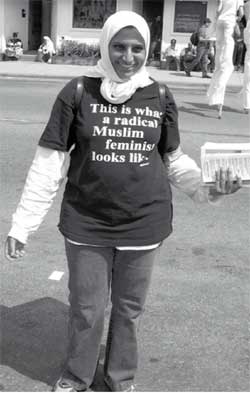 Sevinc Karaca, a Turkish anarchist and feminist, describes the fine line that Muslim women must navigate between Islam and the West. "In all Muslim countries, women had to wait until the 1970s and 1980s for a feminist movement that questioned the practise of religion and its role in the oppression of women. As Feminists in the West beat around the bush with an air of multi-culturalist political correctness and go out of their way to show respect for exotic religions, there is a growing number of feminists in countries like Turkey and Iran and among the diaspora in non- Muslim countries whose policies and strategies for feminism do not take the route of Western Liberal Feminism. The majority of feminist ideologies and activism in the developed world today do not address and support the struggle of their Muslim comrades openly, directly or sufficiently."
Sevinc Karaca, a Turkish anarchist and feminist, describes the fine line that Muslim women must navigate between Islam and the West. "In all Muslim countries, women had to wait until the 1970s and 1980s for a feminist movement that questioned the practise of religion and its role in the oppression of women. As Feminists in the West beat around the bush with an air of multi-culturalist political correctness and go out of their way to show respect for exotic religions, there is a growing number of feminists in countries like Turkey and Iran and among the diaspora in non- Muslim countries whose policies and strategies for feminism do not take the route of Western Liberal Feminism. The majority of feminist ideologies and activism in the developed world today do not address and support the struggle of their Muslim comrades openly, directly or sufficiently."
The 10/10 Event: Origins of an Economic Meltdown

The purpose of this text is to try and tell the story of our current economic situation, how we got here, and what we can expect from the near future, so as to better understand the tasks facing us.
This is neither an academic text on history, nor yet, god forbid, a treatise on macroeconomics. So in the interests of telling a listenable story we will use the old storytelling technique of jumping directly into the middle and exploring outwards in flashback and flash-forward vignettes to build the big picture. But where is the middle?
Irish Anarchist Review No 2
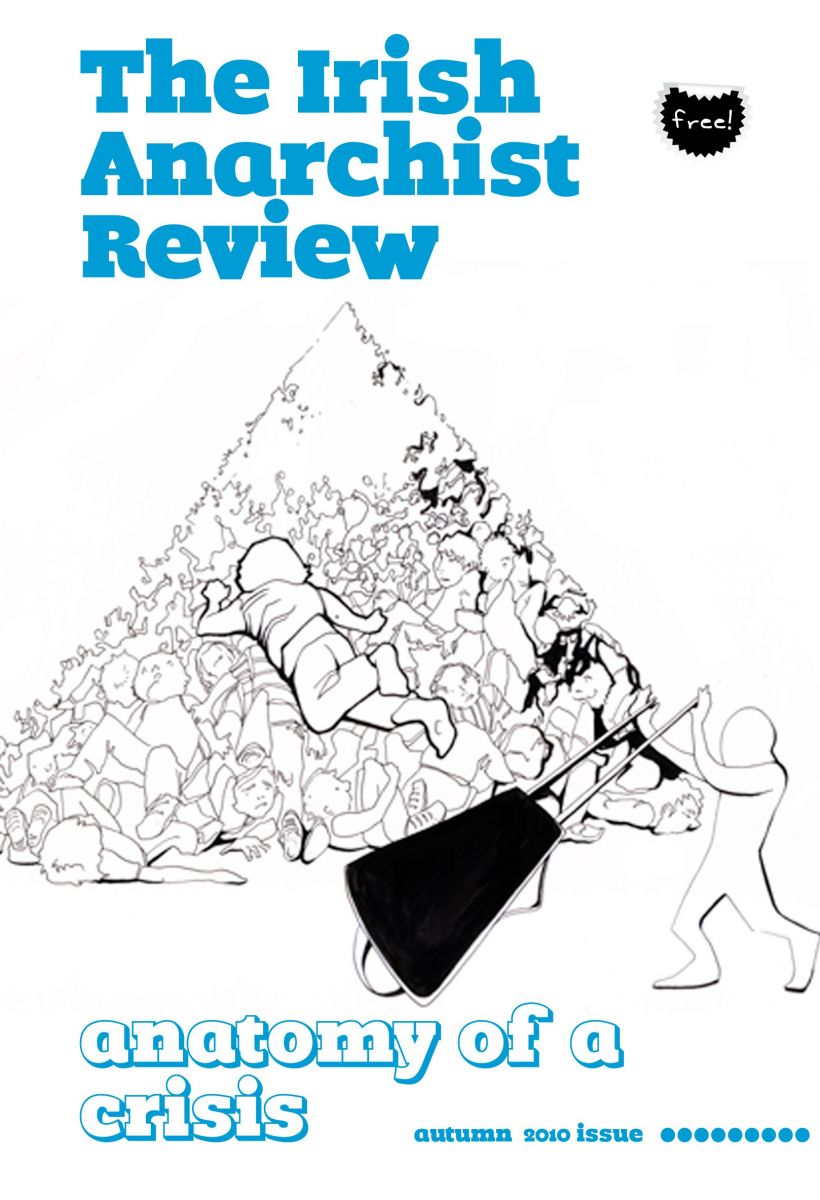 The Workers Solidarity Movement is very pleased to announce the second issue of The Irish Anarchist Review. This magazine is dedicated to understanding the contemporary political, economic and social situation that confronts us, and finding ways to advance alternatives.
The Workers Solidarity Movement is very pleased to announce the second issue of The Irish Anarchist Review. This magazine is dedicated to understanding the contemporary political, economic and social situation that confronts us, and finding ways to advance alternatives.
Download The Irish Anarchist Review Issue 2
Our first issue was released in the aftermath of major strikes across the public sector. Despite decades of partnership, a deflated union movement and an intense barrage of media bile, Irish workers showed their willingness to take to picket lines to fight the Government.
Now, however, we can see that the union leadership were not willing to fight - they quickly demobilised strike action to return to the bargaining table, squeezing out a disgraceful deal in Croke Park negotiations. Now, without opposition, the Government calmly talks of four-years of ‘hair-shirt’ budgets to restore the national finances.
Shifu and the possibilities for Chinese Anarchism
 In July 1914, the Shanghai Association of Anarchist Communist Comrades published its statement of principles, concluding with the resolution that, "the implementation of anarchist communism depends on the strength of our party. If we wish to increase our party's strength, uniting as a whole body and advancing together is our most important task today. Wherever they are, all our comrades should unite with those who share the same purposes and establish groups in free association.” The key member of this group was a Chinese anarchist known as Shifu who was to die a mere nine months later. Although the group carried on after his death, the core concept of this paragraph was never to be implemented.
In July 1914, the Shanghai Association of Anarchist Communist Comrades published its statement of principles, concluding with the resolution that, "the implementation of anarchist communism depends on the strength of our party. If we wish to increase our party's strength, uniting as a whole body and advancing together is our most important task today. Wherever they are, all our comrades should unite with those who share the same purposes and establish groups in free association.” The key member of this group was a Chinese anarchist known as Shifu who was to die a mere nine months later. Although the group carried on after his death, the core concept of this paragraph was never to be implemented.
Faceless Resistance, Precarity and union organising - a reply to Andrew Flood
In Issue 1 of the Irish Anarchist Review, Andrew Flood put forward a critique ('Capitalist crisis and union resistance in Ireland') of two of the other articles in the same magazine, my article on Faceless Resistance and James R's interview with Alex Foti. His critique centers around the experience of the radical left in Ireland around workplace organising since the anti-globalisation movement and the experience of workplace activism since the economic crisis. In his article he attacks what he sees as an unbalanced concern with marginal sectors of employment on the part of the radical left since the turn of the century. He argues that the experience of the crisis shows that radical efforts to organise 'precarious' workers do not pay off. Instead, radicals should focus on organising where there is a greater chance of having a serious influence - i.e. within large mainstream trade unions.
Irish Anarchist Review Issue 1
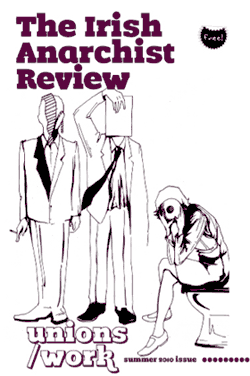 Welcome to the first issue of The Irish Anarchist Review, the new political magazine from the Workers Solidarity Movement. This magazine will explore ideas and practical struggles that can teach us about building a revolutionary movement today. We decided to cease printing Red & Black Revolution, and start this project, aimed at provoking debate and discussion among anarchists and the left. For this purpose, we will be pursuing a non-sectarian approach, taking ideas from various left currents, mainstream discourse, and reflections on experiences of life and struggle. We will take, print, and discuss, anything that we find useful for our needs. We hope that readers will have a similar attitude, and will use the magazine to discuss, debate and develop ideas. We will also welcome submissions and responses to articles.
Welcome to the first issue of The Irish Anarchist Review, the new political magazine from the Workers Solidarity Movement. This magazine will explore ideas and practical struggles that can teach us about building a revolutionary movement today. We decided to cease printing Red & Black Revolution, and start this project, aimed at provoking debate and discussion among anarchists and the left. For this purpose, we will be pursuing a non-sectarian approach, taking ideas from various left currents, mainstream discourse, and reflections on experiences of life and struggle. We will take, print, and discuss, anything that we find useful for our needs. We hope that readers will have a similar attitude, and will use the magazine to discuss, debate and develop ideas. We will also welcome submissions and responses to articles.
The IWW and The Making of a Revolutionary Working Class Counter culture
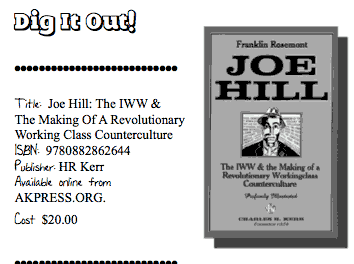 The book can be read in a number of ways; on one hand it rescues the IWW from Stalinist critics that fashionably flounced after Russian Bolshevism; it gives insight to the politics and personalities of the union itself and rescues Hill the man. But as suggested by the subtitle, it’s Rosemont’s treatment of how the IWW built a counter hegemonic working class culture that is the most interesting facet of this brick thick work.
The book can be read in a number of ways; on one hand it rescues the IWW from Stalinist critics that fashionably flounced after Russian Bolshevism; it gives insight to the politics and personalities of the union itself and rescues Hill the man. But as suggested by the subtitle, it’s Rosemont’s treatment of how the IWW built a counter hegemonic working class culture that is the most interesting facet of this brick thick work.
The unions after the celtic tiger
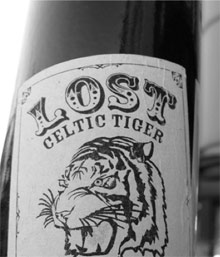 A rather strange figure is moving to centre stage in Irish politics, that of the trade unions - absent from mass struggles until recently and weakened over the decades of social partnership, they are now the only possible source of a movement that can confront attemps to transfer the cost of the recession to working people. This statement does not come with out some qualms. Already this year we’ve seen the union movement back away from its role in galvanizing its members in the run up to planned day of action on March 30th when resistance was taking shape among the public sector unions.
A rather strange figure is moving to centre stage in Irish politics, that of the trade unions - absent from mass struggles until recently and weakened over the decades of social partnership, they are now the only possible source of a movement that can confront attemps to transfer the cost of the recession to working people. This statement does not come with out some qualms. Already this year we’ve seen the union movement back away from its role in galvanizing its members in the run up to planned day of action on March 30th when resistance was taking shape among the public sector unions.
Checkout: Life On The Tills
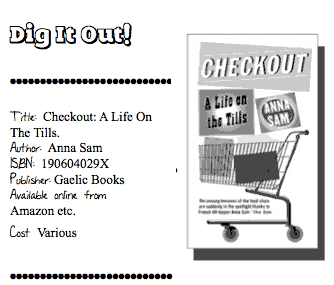 “Anna Sam”, as you might guess, is a pseudonym, the handle of a French blogger who decided to put her years behind the till to good use on a website describing the day-to-day experience of supermarket workers in all its tedious glory. In a way it’s refreshing to discover that the psychology of the checkout girl / boy appears to be the same wherever you go - my own days at Centra and the like are well imprinted on the brain, but they could have been an atypical reflection of my general misanthropy, grumpiness and ill will towards the rest of the species. But Anna reports more or less the same irritations - the only difference being that, on account of her gender, she must also bat away the sleazy or sheepish advances of French manhood on a daily basis.
“Anna Sam”, as you might guess, is a pseudonym, the handle of a French blogger who decided to put her years behind the till to good use on a website describing the day-to-day experience of supermarket workers in all its tedious glory. In a way it’s refreshing to discover that the psychology of the checkout girl / boy appears to be the same wherever you go - my own days at Centra and the like are well imprinted on the brain, but they could have been an atypical reflection of my general misanthropy, grumpiness and ill will towards the rest of the species. But Anna reports more or less the same irritations - the only difference being that, on account of her gender, she must also bat away the sleazy or sheepish advances of French manhood on a daily basis.
Mayday had become like a funeral - interview with Alex Foti
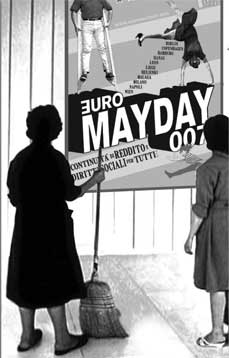 In August of 2008, Italian media activist Alex Foti visited Dublin. In the middle years of this decade, Alex Foti became known across activist circles for involvement in the Euromayday Parades. In a special themed issue of Green Pepper, Foti and the Chain Workers Collective sketched a very attractive understanding of the work discipline of contemporary capitalism. In their understanding, society had found itself in a situation of profound disjuncture with our working pasts - life today was defined by contingent employment rather than the traditional job for life.
In August of 2008, Italian media activist Alex Foti visited Dublin. In the middle years of this decade, Alex Foti became known across activist circles for involvement in the Euromayday Parades. In a special themed issue of Green Pepper, Foti and the Chain Workers Collective sketched a very attractive understanding of the work discipline of contemporary capitalism. In their understanding, society had found itself in a situation of profound disjuncture with our working pasts - life today was defined by contingent employment rather than the traditional job for life.
Working through Chainworkers, Foti and others developed the Euro Mayday Parade as an opportunity for this sentiment pool to express itself in European cities, along the way they developed a graphical tool set and pioneered a new vision of a combatative class movement that drew huge attention to the question of workers marginalised from the traditional unions.

